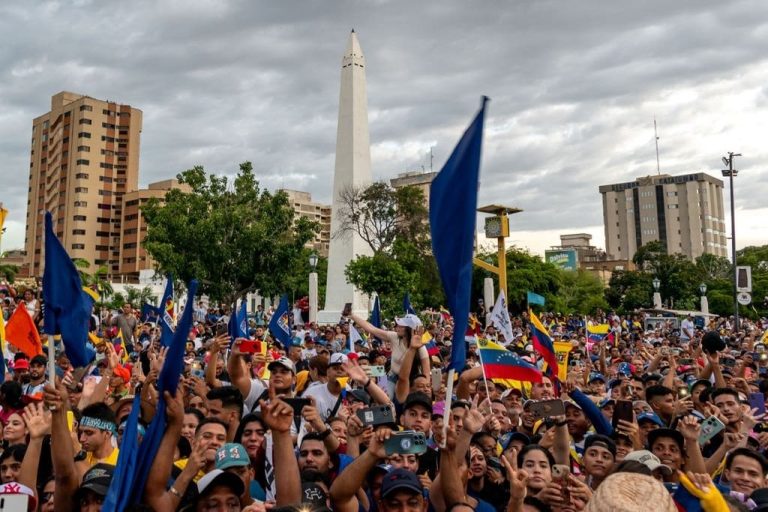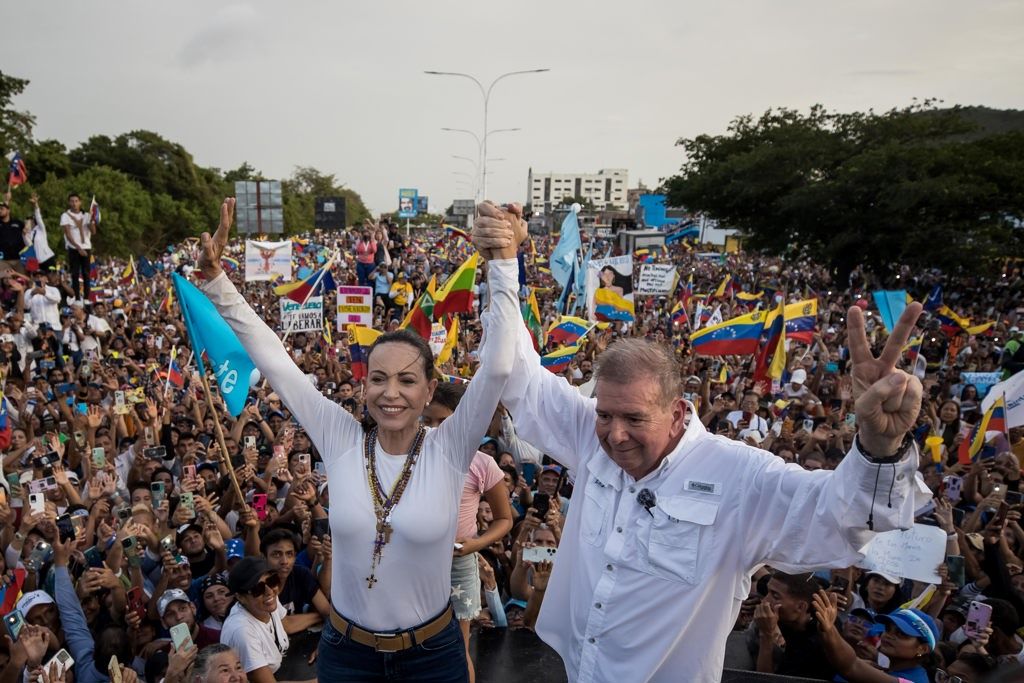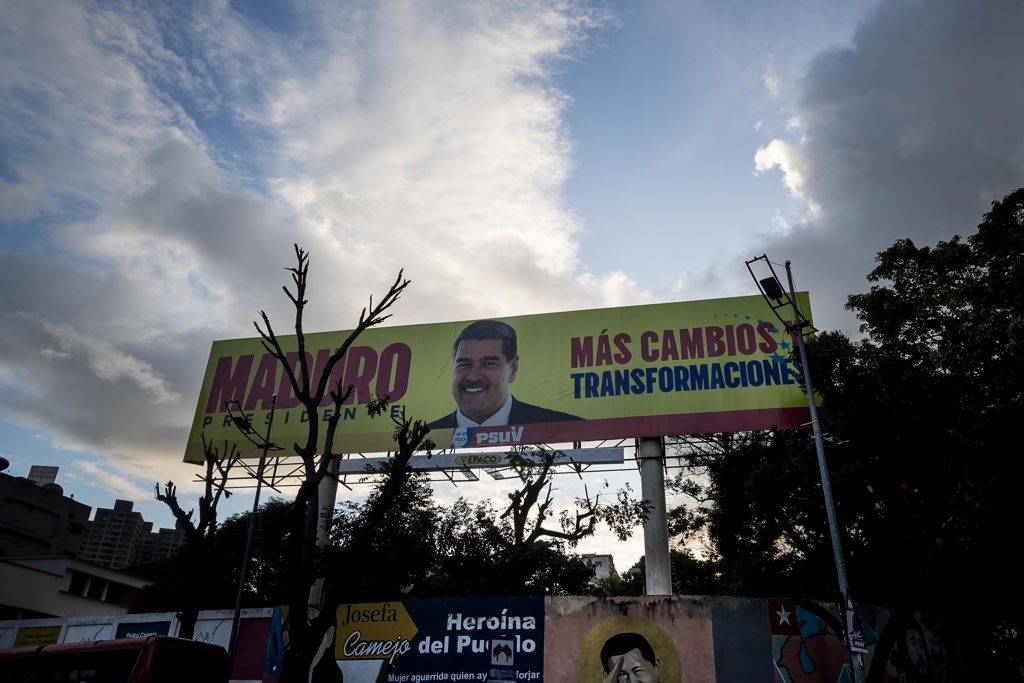27 de julio 2024

Children of Exile: The Births “Sowing Hope” in the Camp of Nicaraguan Farmers

PUBLICIDAD 1M
PUBLICIDAD 4D
PUBLICIDAD 5D
Maryhen Jimenez: Multiple challenges of a democratic transition: “consensus, coordination, participation, and not underestimating the adversary”

Supporters of the Democratic Unity Platform (PUD) attend a campaign rally in Maracaibo, Venezuela. Photo: EFE/Luis Carlos Sánchez
Four days before the elections on Sunday, July 28, Venezuelan voters are torn between the “hope of change” proposed by the united opposition candidate Edmundo Gonzalez, and the “fear” campaign promoted by President Nicolas Maduro, who predicts there will be a “bloodbath” if he does not win decisively at the polls.
Although all polls show Gonzalez leading Maduro by a margin of 20 to 30 points, observers are focused on the “electoral traps” promoted by Chavismo, relying on its political control of the National Electoral Council to discourage citizen participation and encourage null votes.
Political scientist Maryhen Jiménez, a researcher at Oxford University and an expert on authoritarian regimes, believes that “the important thing is the massive participation of Venezuelan society, as long as the difference in votes is significant. And above all, to have witnesses with the vote tabulation sheets in hand, who can attest to what happened and have proof of the will of Venezuelan society that day.”
If the poll projections are confirmed, Jimenez predicts a democratic transition process with multiple challenges for the opposition, which would become the government in January 2025. “Building consensus and agreements, promoting cooperation among politicians, recognizing the participation of civil society in the transition, and above all, not underestimating the adversary who will continue to hold significant power. These processes are fragile, and the new government’s biggest challenge will be reducing uncertainty,” she concluded.
Today the electoral campaign closes in Venezuela, and so far, despite being a completely unbalanced campaign in favor of the regime, all polls give the opposition candidate Edmundo Gonzalez a considerable advantage over President Nicolas Maduro. What do these electoral projections mean?
It has been an unequal campaign in an authoritarian context. It is the least competitive campaign since 1999, where the opposition has faced a series of obstacles. For example, it has had no access to media, radio, or television, and very few resources to travel and reach communities. There has been a lot of harassment. However, they have managed to overcome all these obstacles, including the disqualification of primary winner Maria Corina Machado, and have managed to transfer that enthusiasm to Edmundo Gonzalez, who is now the candidate of the Democratic Unity Platform.
Edmundo Gonzalez holds the preference in the polls due to the desire for change in Venezuela across all sectors. When we look at serious polls in Venezuela, even discontented Chavistas indicate they desire change.
The uncertainty is also lived with the hope of a possible transition to another political system, with the possibilities of an improvement in the quality of life and also the possibility of the return of many family members who have been forced to emigrate. This has been the strength of the opposition campaign, offering improvement, quality of life, and the return of family members whose exodus has caused significant gaps and pain in Venezuelan society.

It has also been a great surprise that Maduro has allowed this campaign to advance. Despite these restrictions, the Chavismo side is confident that other polls favor Nicolas Maduro, and therefore, they have allowed the electoral process to go forward. But according to what we understand, those figures are based on the estimated number of people who will actually vote on the 28th, after the effect that some obstacles might have on the opposition voter turnout. Can you estimate the impact of these “electoral traps” can have on voting?
There is a negotiation framework that, although it has been breached and also recessed, it is a framework, and that is why the primaries were also held last year as part of that negotiation. International actors have played a role, and the candidacy of Edmundo Gonzalez on the Democratic Unity Platform’s ticket has been maintained until today.
The government has run a campaign and maintained confidence in victory. Government spokespeople say that the Venezuelan people will celebrate the victory with the government candidate, while all the polls say otherwise. From now until the election, the government will increase intimidation in multiple ways to provoke a possible abstention that could disadvantage the opposition candidate and try to intimidate opposition poll watchers. The government believes this combination of elements can change the outcome that the polls have been predicting.
That is why the work of Venezuelan civil society and the opposition leadership to redouble efforts for poll watchers is so important. Not only the people who will be sitting at the tables but also a whole support network for the witnesses to be present, hydrated, fed, and feel accompanied on that long day of tension.
However, the latest serious polls speak of a margin of 24 to 26 points difference, a really difficult figure to reverse. It seems that Venezuelan society is headed toward the desire for change in all sectors, not only the traditional opposition voter but also that discontented Chavismo voter that is also suffering from the social, economic, and political crisis.
What capacity do international observers from the Carter Center, who are the only independent international observers accredited, and the opposition witnesses have to detect fraud or anomalies? To begin with, how many opposition witnesses or poll watchers have been accredited at this time?
In recent days, the opposition has spoken of having 99% voting station coverage, which would be the highest percentage achieved in all electoral processes. The important thing is that this materializes on election day, meaning that all the witnesses go to their polls and know how to act. There should be a manual of what to do, a protocol of steps to take. The opposition has said that the polling places should not be left alone, but that citizens should be present during the vote counting.
Regarding the role of the Carter Center, we know from existing literature that international observation can encourage participation because people have a perception that someone is watching. I find it valuable that they are there. Evidently, it would have been important for a European Union electoral observation mission to attend to strengthen the process further. The most important thing is the articulation and communication with all involved when tension comes. It is important to have people who have observed the process and can attest to what happened.
If Chavismo is confident that Nicolas Maduro will win, how should Maduro’s threats of a “bloodbath” or “civil war” if they lose the election be interpreted? These statements even prompted a warning against Maduro from Brazil’s President Lula, stating that he must be prepared to accept the election results.
This is a strategy to intimidate opposition voters and a broad margin of voters who are convinced to vote. There is a significant change in Venezuelan society that imposes on its elites the electoral and peaceful route as a mechanism for transforming the conflict it has been experiencing. The society itself believes it is an agent of change, that it is through voting that change can be achieved.
Therefore, an autocrat who has been losing popular support must do everything contrary to that will for change. These messages are aimed at those sectors to demobilize them, to make them feel uncertain. We will know if it had an effect on election day, and we will also know through reports from journalists and civil society how participation was.
The government’s campaign has been one of fear based on attacking the opponent. Meanwhile, the opposition’s campaign has been one of hope and expectation of change. It is an unequal struggle, but it is no longer a government of the masses. At one point, (Hugo) Chavez had huge support, it was a mass movement. Today they try to impose Chavista identity on discontented Chavistas, and there are risks in forcing someone to be a Chavista, which has also been attempted in this campaign to close ranks. It can have a boomerang effect; it can go against the government because it can mobilize the opposition.
Over all these years, the Venezuelan Army has become a politically committed institution aligned with Chavismo. In a situation of controversy over the election result, might they support impartial arbitration, or are they already totally aligned with Nicolas Maduro?
Public messages have been to show cohesion and unquestionable support for the government. However, it is also possible, although it sounds unreal, that they recognize the electoral results if we also consider other past realities in other countries, which also occurred in Chile (1988) and Nicaragua (1990). Therefore, massive participation of Venezuelan society is important, as long as the vote difference is significant, and above all, having the witnesses with the poll results to attest to what happened and have proof of the will of Venezuelan society that day.
In the event that the opposition manages to win by the margin you mentioned, what would be the main challenges in a democratic transition for Edmundo Gonzalez, the candidate who would be the president, of an electoral coalition led by Maria Corina Machado?
There would be multiple challenges. The opposition has been out of Miraflores Palace for 25 years and has limitations regarding the real state of the institutions internally. There will be a significant learning period and, above all, the need for institutional reforms and public policies. To re-institutionalize the country and alleviate the situation of Venezuelan society, it is necessary to build broad consensus.
For that, coordination among those who are opposition today but would be a new government in the event of a victory, is very important. This is central because politicians are always in the dilemma of competition-coordination.
It is possible that some elites want an immediate reconfiguration of leaders, but if a single force manages to impose itself over others, those agreements might not be sustainable over time. Therefore, building consensus is important.
Secondly, I find it important that a new government and its representatives understand the changes in Venezuelan society. The last democratic proposal in 1958 came from the elites to society; today, Venezuelan society is different, with eight million people abroad, socialized in other contexts, exposed to other ideas, and the society itself sees itself as an architect of its own destiny. It has carried out this campaign on its own, financing its travel to see Maria Corina and Edmundo Gonzalez, and will do the same on election day. Instead of creating a new top down democracy, it is important to consider and involve society in this transition process.
Lastly, not underestimating the adversary or the Chavismo government. Some may think that if Maduro loses the election, they would be finished for good. One must be more cautious; the governing party will maintain the National Assembly for a while, will keep mayors, governors, and control of other institutions. Thinking about these new power relations without underestimating the power of these actors will also be key, especially if a new democracy without a return to authoritarianism is desired. These processes are fragile, full of uncertainty, and reducing it will be the new government’s most important task.

Edmundo Gonzalez would be the president of the republic, but María Corina Machado would remain the political leader of this coalition and this transition. What is the balance of power between them?
She was asked that question in a recent interview and replied: “The president of Venezuela will be Edmundo González.” She also said she would serve Venezuela in the place that corresponds to her. That shows detachment and understanding that a new president is the new executive. I think that since she now has significant popular support, she can try to have influence and should have an influence in a new government. She achieved her support by determination and will probably work on multiple levels to consolidate and legalize that movement and participate in new [partial] elections.
If she will be part of the government in an official role, I can’t say. What I do believe is that Maria Corina (Machado) understood that she could win elections and move Venezuelan society’s fiber. I imagine she will institutionalize those ties she built with society from her victory in the opposition primary last year.
Finally, let’s see the other side of the coin. If a rigged victory for Chavismo is imposed, what impact would this have on Venezuela’s future? Would Nicolas Maduro’s regime stabilize? Will the exodus continue? Could there be another form of transition?
If the government manages to impose itself, it would be a bad sign for Venezuelan society, which desires change and needs to improve its quality of life. The suffering of a high percentage of the population will be prolonged. On the other hand, emigration will increase or continue for part of society. It could be unsustainable to impose with very little support.
New negotiations could also open up in the future, as there are new parliamentary and regional elections in 2025. Therefore, I still see possibilities to pressure the government to avoid closing further. Evidently, a greater closure is always possible. However, it is important to say, in contrast to other societies that could not resist the autocrat’s will to close completely, that the opposition in Venezuela still has the capacity to confront and put some brakes on the autocrat.
So, we have discussed multiple scenarios, but I do not rule out the possibility that even if the government imposes itself, there could be different opportunities for the opposition in the near future.
This article was published in Spanish in Confidencial and translated by Havana Times. To get the most relevant news from our English coverage delivered straight to your inbox, subscribe to The Dispatch.
PUBLICIDAD 3M
Periodista nicaragüense, exiliado en Costa Rica. Fundador y director de Confidencial y Esta Semana. Miembro del Consejo Rector de la Fundación Gabo. Ha sido Knight Fellow en la Universidad de Stanford (1997-1998) y profesor visitante en la Maestría de Periodismo de la Universidad de Berkeley, California (1998-1999). En mayo 2009, obtuvo el Premio a la Libertad de Expresión en Iberoamérica, de Casa América Cataluña (España). En octubre de 2010 recibió el Premio Maria Moors Cabot de la Escuela de Periodismo de la Universidad de Columbia en Nueva York. En 2021 obtuvo el Premio Ortega y Gasset por su trayectoria periodística.
PUBLICIDAD 3D